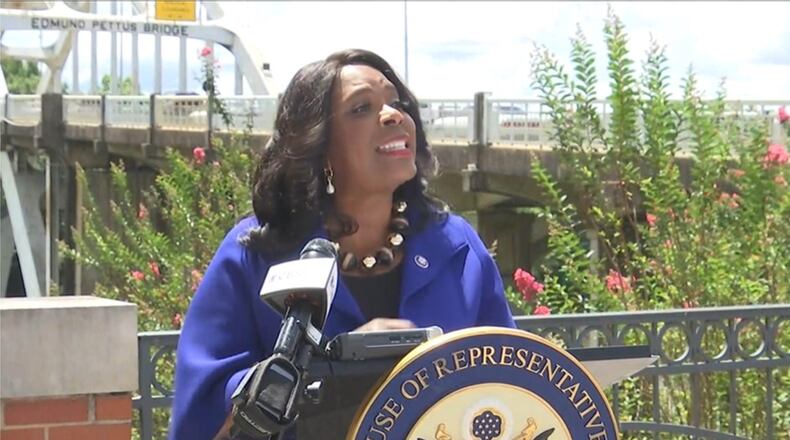Congressional Democrats are stepping up efforts to pass voting legislation, unveiling a revised bill to reinstate federal review of changes to laws in states and jurisdictions with a history of discrimination.
But the threat of a Senate filibuster blocking the bill from becoming law remains, even as the House plans to quickly pass the legislation next week.
Democrats consider passing federal voting legislation a priority. The once-a-decade redistricting exercise begins nationwide soon, and Democrats are concerned that Republican-led states will enact maps that are engineered to keep the GOP in power for years by diluting the voting strength of people of color and other marginalized groups.
Republicans, on the other hand, say federal voting legislation is unnecessary, infringes on states’ ability to write their own election and voting rules, and amounts to nothing more than a Democratic power grab.
The main goal of H.R. 4, named the John Lewis Voting Rights Advancement Act after the late Georgia congressman, is to strengthen provisions of the 1965 Voting Rights Act that were struck down or weakened by a 2013 U.S. Supreme Court ruling and then more recently by a July 1 decision on a second case.
U.S. Rep. Terri Sewell, an Alabama Democrat, is the primary sponsor of H.R. 4. Standing at the foot of the Edmund Pettus Bridge in Selma where Lewis and other activists were beaten during a voting rights march that became a turning point of the civil rights movement, she said that federal legislation is needed to ensure that future generations have their access to the ballot box protected.
“I think it’s really sad that 56 years later, the cause for which John Lewis and those foot soldiers marched has now become our cause,” Sewell said. “But we must be equal to the task and stand up and make sure that we restore federal oversight to voting laws once again.”
House Democratic leaders, including Speaker Nancy Pelosi, are hoping that the bill wins passage in that chamber as soon as next week, when members return from summer recess to work on spending measures.
“As confirmed in a recent House report, Congress has not only an ironclad Constitutional mandate, but a moral responsibility to enact H.R. 4 to combat destructive and discriminatory voter suppression,” Pelosi said in a statement. “In doing so, we live up to the powerful legacy of this bill’s late namesake, Congressman Lewis: a titan of the civil rights movement and a courageous champion for voting rights.”
Sewell said she already has 190 co-sponsors on this latest version of the bill, including all six Democrats in Georgia’s delegation. She introduced similar proposals over the past several years, and the House passed it during the last session of Congress with all but one Republican opposed.
At the time, Republicans had the majority in the Senate, and companion legislation was never brought up for a vote in that chamber.
Democrats are now in control of the Senate, but Republicans have used filibuster rules to block passage of other election proposals this year, such as a sweeping measure known as the For the People Act. It would create new federal standards for early voting, voter registration, redistricting and campaign finance.
Georgia U.S. Sen. Raphael Warnock will be one of his chamber’s primary sponsors of the John Lewis Voting Rights Advancement Act, which will be known as S.4. But there is no timeline for when it will be introduced, and it is unlikely to pass in that chamber unless all 50 members in the Democratic caucus agree to revise filibuster rules that create a 60-vote threshold for most bills to advance.
The new H.R. 4 creates a new formula to determine which jurisdictions would have to have a federal court or agency sign off on changes to their election and voting procedures, a policy known as “preclearance.”
The Supreme Court’s 2013 ruling in Shelby v. Holder struck down that portion of the Voting Rights Act because the justices agreed that the law that subjected many Southern states, including Georgia, to review had become outdated.
Under the new formula, states or jurisdictions with multiple voting rights violations over the past 25 years — or since 1996 — will be subject to preclearance. During the news conference, Sewell pointed out that 18 states recently passed new restrictive voting laws, a number that includes Georgia.
The bill also addresses the Supreme Court’s ruling in the Brnovich v. the Democratic National Committee case. That July decision held up an Arizona law that tosses out ballots cast in the wrong precinct on election day despite some evidence that racial minorities are disproportionately affected. The ruling was widely considered by Democrats as further weakening the Voting Rights Act.
Under H.R. 4, the law will be revised to create new standards for determining whether a law dilutes the power of certain voters or makes it tougher for them to cast votes.
Voting rights groups and activists quickly came out in favor of this latest draft bill, saying its protections are needed to ensure free and fair elections. Those groups include the Southern Poverty Law Center, the League of Women Voters and End Citizens United/Let America Vote.
Martin Luther King III said protecting the right to vote is a continuation of the civil rights legacy that includes his father and Lewis.
“It is the cornerstone of democracy, the way we have our voices heard,” he wrote on Twitter. “Congress must pass the John Lewis Voting Rights Restoration Act.”
About the Author
Keep Reading
The Latest
Featured




